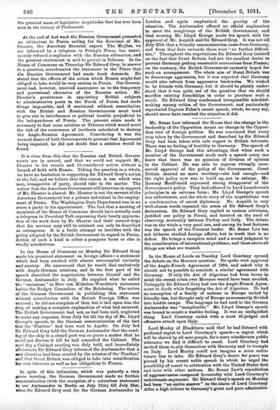At the end of last week the Russian Government presented
an ultimatum to Persia calling for the dismissal of Mr. Shuster, the American financial expert. The Mejliss, we are informed by a telegram in Friday's Times, has unani- mously refused compliance with the Russian ultimatum, and the greatest excitement is said to prevail in Teheran. In the House of Commons on Thursday Sir Edward Grey, in answer to a question, corroborated the statement in the Times that the Russian Government had made fresh demands. He stated that the effects of the action which Russia might feel obliged to take would be very serious in Persia. Our Govern- ment had, however, received assurances as to the temporary and provisional character of the Russian action. Mr. Shuster's persistence in appointing British subjects to administrative posts in the North of Persia had made things impossible, and if continued without consultation with the British and Russian Governments must tend to give rise to interference or political trouble prejudicial to the independence of Persia. The present crisis made it necessary to find some solution at Teheran which would avert the risk of the recurrence of incidents calculated to destroy the Anglo-Russian Agreement. Considering it was the earnest desire of Loth Governments to prevent that Agreement being impaired, he did not doubt that a solution would be found.


































































 Previous page
Previous page